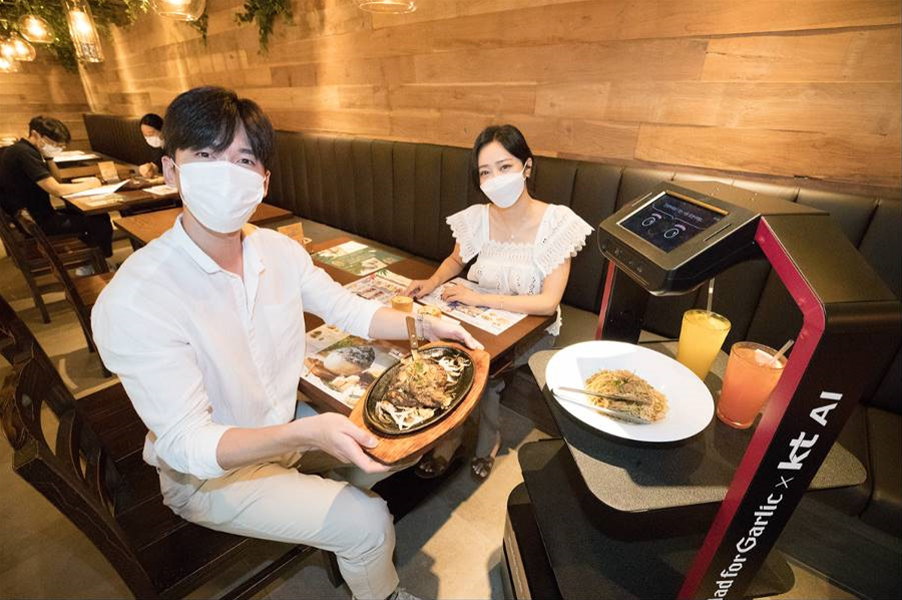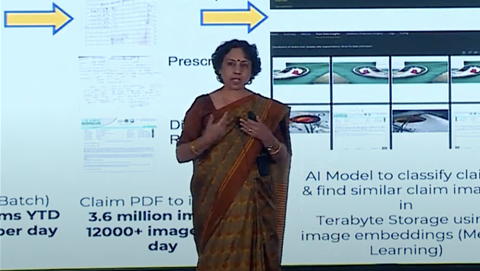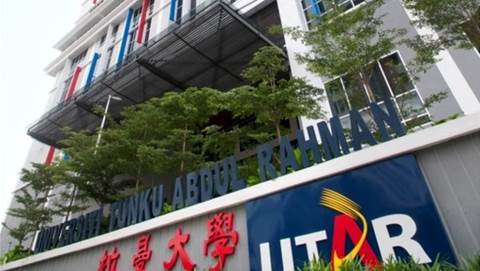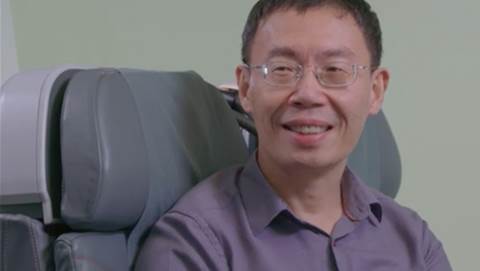South Korean mobile operators are now increasingly expanding their service offerings with AI technology as they shift focus from traditional telecom services to find new growth drivers and remake themselves as tech solution providers
Korea Telecom (KT) recently partnered with Hyundai Home Shopping Network to establish an AI call centre at the retail company's headquarters in Seoul.
The service incorporates voice recognition and text analysis technology so that AI can help customers with simple questions and can carry out tedious tasks, such as customer authentication. KT said it decided to develop the AI service to help tackle increased call centre use amid the pandemic.
In September, the mobile operator introduced an AI-powered robot food server at a Seoul franchise of Mad for Garlic, a major Korean nationwide restaurant chain.

Korea Telecom’s AI robot uses 3D-mapping to weave and dodge between staff, tables and chairs to serve diners at the Mad For Garlic restaurant in Seoul
The AI robot server, is equipped with state-of-the-art software that features 3D spatial mapping and self-driving. The programming, developed by KT’s Institute of Convergence Technology, enables the smart robot to manoeuvre between and around tables and chairs to serve customers ordering food at the restaurant.
KT’s newly appointed CEO Koo Hyun-Mo has laid out a new vision and said that the company does not intend to be a telecom service provider, but will strive to reposition the company as ‘a comprehensive platform operator’ and generate half of its revenue from non-telco business by 2025.
“We will shift our focus from the telecoms sector, where growth has stalled due to government regulations, to AI, big data, and cloud computing to become the nation's No. 1 platform operator in the B2B market," Koo Hyun-mo said at a press conference to Korea media last October.
New AI focus for SK Telecom
Similarly, SK Telecom (SKT) has changed the name of its AI service division into AI&Co to ramp up development of AI services that can be applied to the different products and services of SKT and the rest of the SK Group.
SK Telecom’s growth strategy is focused on monetising 5G and AI where it sees the potential for revenue to replace that lost from its core mobile business. It plans to integrate AI to personalise user experience and will soon release AI-based subscription services by partnering with companies in the food and beverage, education, rental and travel sectors.
The operator, the largest mobile operator in South Korea with a 42% share of the mobile market, recently launched a cloud-based customer contact centre service that incorporates an AI chatbot tool to respond to queries, in a partnership with Amazon Web Services.
The chatbot tool is the first open-source, advanced Korean language Generative Pre-trained Transformer-2 (GPT-2) model, called KoGPT-2.
GPT-2 has been a rave in the AI global community and is a language model that has been trained to predict – or to ‘generate’ – the completion of a sentence or a paragraph based on as little as a one-word prompt. It was developed in 2019 by OpenAI, an AI research firm. The GPT-2 model is similar to the next-word prediction on your smartphone keyboard, but is much more advanced and sophisticated.
KoGPT-2 was developed by a team of deep-learning engineers from the Amazon Machine Learning (ML) Solutions Lab at AWS and the Conversational AI Team from the SK telecom AI Centre.
OpenAI researchers have described the GPT-2 model as ‘chameleon-like’, saying it adapts to the style and context of the conditioning text. To train KoGPT-2, SK telecom created a corpus of 125 million sentences and more than 1.6 billion words, drawing on data from the Korean Wiki Project, Korean news sources, and other sources.
In December, SK Telecom, internet provider Kakao, and Samsung Electronics said they were joining forces in using AI to analyse COVID-19 threats in real time and predict movement patterns. They aim to launch the service in the first half of 2021. The AI application will monitor infection threats for a user’s current position, using it to provide social distancing recommendations or suggest routes to avoid the threats.
SK Telecom has also started 5G technologies as well. The mobile operator installed 5G RF repeaters developed by its engineers in major cities in Germany during the second quarter of 2020.
LG Plus moves into new markets
LG Uplus, which is rapidly growing its 5G market share against the other big two telcos, has recently launched a division dedicated to finding new business opportunities encompassing areas from health care, security and education to advertisement, content and data.

LGPlus’ AI Coach helps fashion models train their routines in the comforts of their home using the Smart Home service
The mobile operator created lifestyle-friendly 5G services Smart Home and U+ AR Shopping, which leverages 5G for the health and shopping sectors. Smart Home provides about 200 health content, including muscle strength, yoga, pilates and stretching, in an exclusive partnership with Kakao VX.
LG Uplus is working with Kakao VX to provide professional coaching programs using renowned Korean athletes and trainers such as Son Yeon-jae (Rhythm Gymnastics) and Hwang Ah-young (Yoga).
U + AR Shopping provides real product images with 360° 3D AR to receive more information on products and services. When users download the U+AR shopping app from the app store and point to the home shopping screen that is airing, information related to the products being broadcast is provided in an AR format.
LG Uplus has also launched a project to improve inconveniences the disabled in the country bface in their daily lives through AI and IoT technology.
As part of this project, LG Uplus, in cooperation with online platform Naver, introduced AI speakers equipped with Naver's AI platform Clova aimed at physically challenged persons, who are now able to call taxi services and other services through a voice interaction with the AI speakers.
The Korean mobile operator has also signed an MOU with Finnish mobile operator Elisa to jointly develop AI powered automation that will improve the way networks are being operated.
The agreement also covers cooperation in innovation, start up collaborations and other services. Both parties will also cooperate to identify new business opportunities with international start ups.










